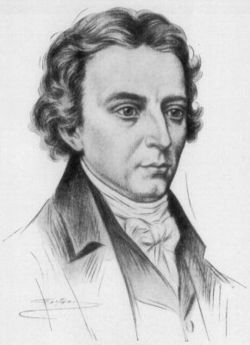Robert Southey (1774- 1843) was a prominent figure in the English Romantic literary movement. He was born on August 12, 1774, in Bristol, England. He was the eldest son of Robert Southey, a linen draper, and Margaret Hill. His family’s financial circumstances were modest, but he was fortunate to receive a solid education. Southey’s early education took place at various schools, including the Bristol Grammar School and Westminster School in London. His interest in literature and writing developed at an early age, and he began composing poetry during his school years. In 1792, he enrolled at Balliol College, Oxford, but his time there was marked by financial struggles, and he left without obtaining a degree. Nonetheless, Oxford exposed him to the intellectual climate of the time, which would later influence his literary pursuits.
During his university years, Southey developed radical and revolutionary political beliefs, inspired by the ideals of the French Revolution. These beliefs found expression in his early works, such as the poem “Joan of Arc” (1796), which celebrated the strength of an individual against societal oppression. Southey’s political ideals also connected him with other writers and intellectuals of his time, including Samuel Taylor Coleridge and William Wordsworth. In 1795, Southey married Edith Fricker, and they settled in the Lake District, a region that would become closely associated with the Romantic movement. Southey became a prominent figure in the Romantic literary movement, along with other writers like William Wordsworth and Samuel Taylor Coleridge. They embraced the Romantic emphasis on emotion, imagination, and individualism in their poetry and prose. His relationship with Coleridge, with whom he collaborated on the play “The Fall of Robespierre” (1794), deepened during this time, and the two poets engaged in discussions on literature, philosophy, and politics.
Southey’s literary output was vast and diverse. He delved into various genres, including poetry, essays, biographies, and historical works. His poem “Thalaba the Destroyer” (1801) showcased his fascination with Arabian mythology and provided a vivid example of his imaginative storytelling. He also explored Hindu mythology and spirituality in “The Curse of Kehama” (1810), displaying his willingness to engage with diverse cultures and mythological systems. One of Southey’s most enduring works was his “Life of Nelson” (1813), a biographical account of Admiral Horatio Nelson’s life and military achievements.
Southey’s political perspectives transformed. Gradually, he grew disillusioned with the radical ideals that had characterized his youth, transitioning towards more conservative stances. His involvement in government appointments, including the Poet Laureateship in 1813, led to accusations of political opportunism. However, it also provided him with financial stability and a platform for his literary works. One of his significant undertakings was the “History of the Peninsular War” (1823–1832), a comprehensive and detailed account of the war against Napoleon in the Iberian Peninsula. This work solidified his reputation as a historian and displayed his dedication to thorough research.
In his later years, Southey’s health began to deteriorate, and he suffered from a series of personal losses, including the deaths of close family members. Despite these challenges, he continued to write prolifically, producing works such as “The Doctor” (1834- 1847) series, which encompassed a wide range of essays and anecdotes on various subjects.
Robert Southey passed away on March 21, 1843, at the age of 68. His legacy as a Romantic poet, historian, biographer, and essayist remains significant. While he faced criticism and shifting public opinions during his lifetime, his contributions to English literature, his engagement with diverse cultures, and his exploration of various genres have secured him a place in the literary canon. His works reflect the intellectual and cultural milieu of his era, making him an intriguing figure for scholars and readers interested in the Romantic period and its literary achievements.

Leave a Reply